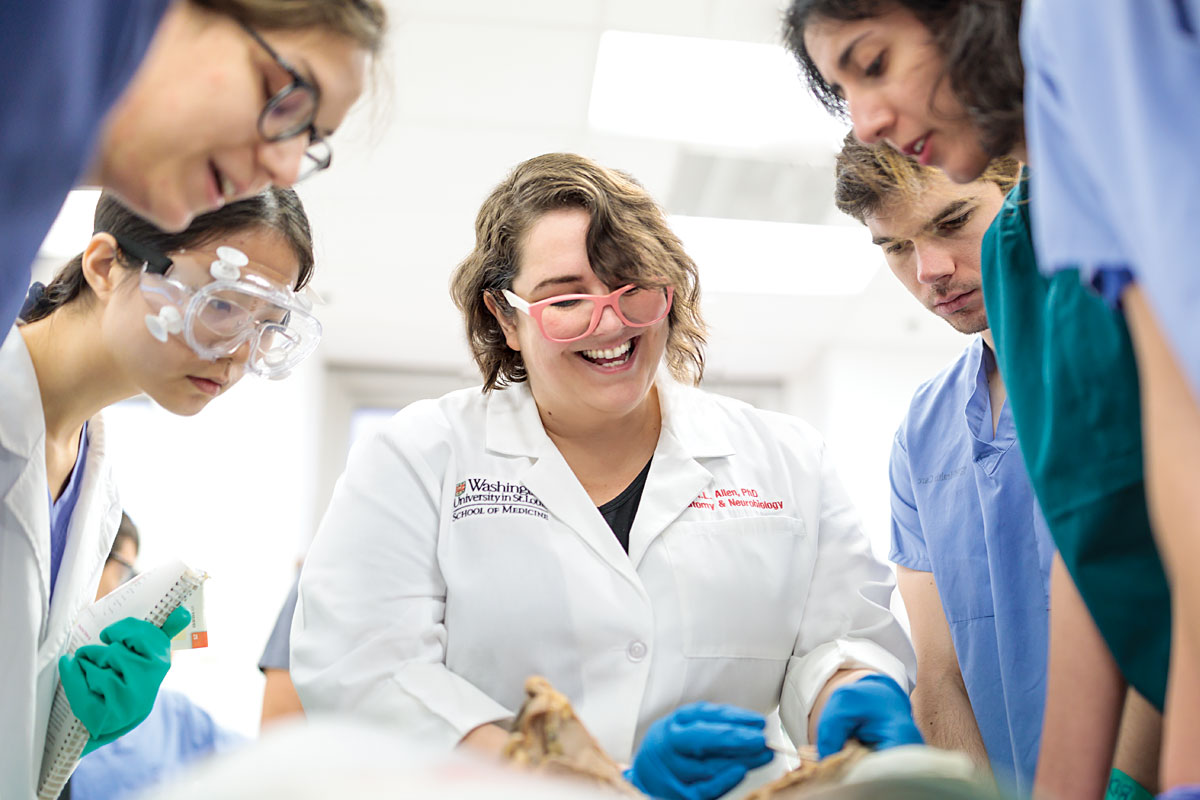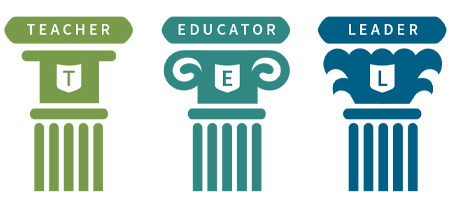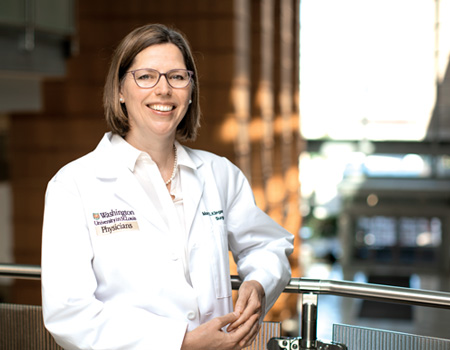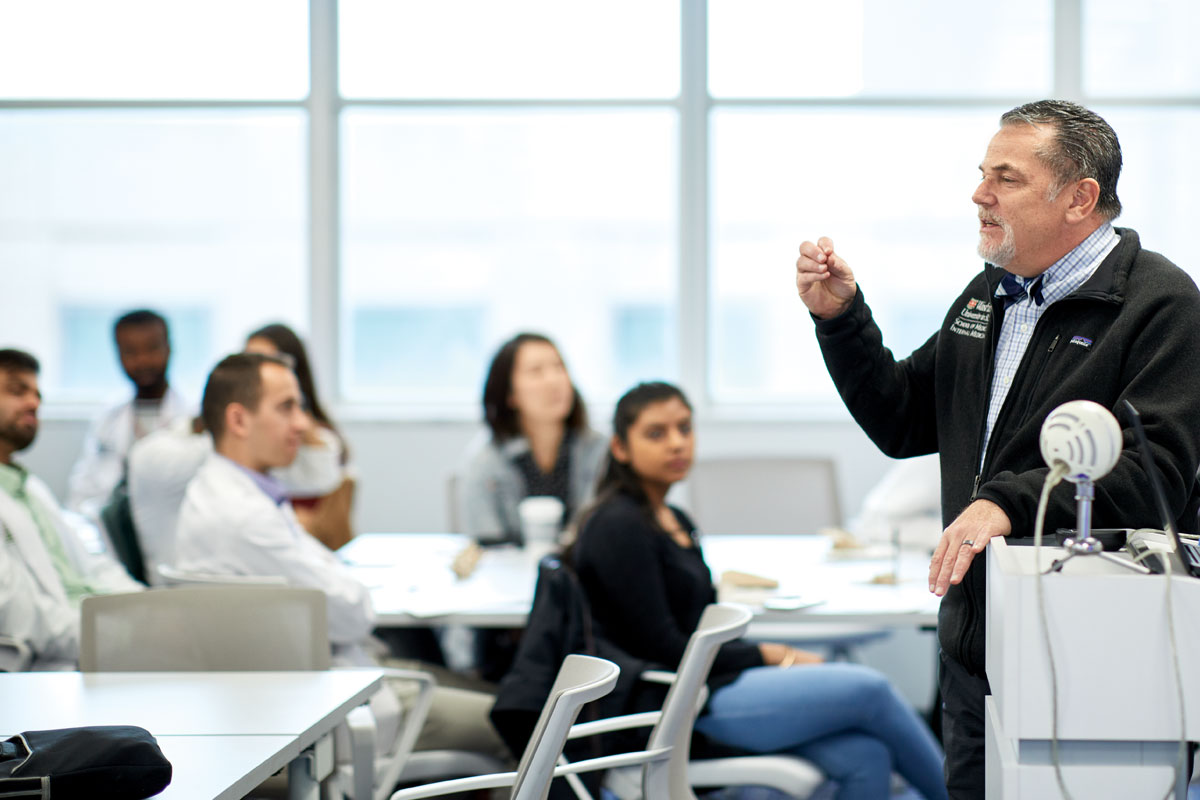
In less than a year, the School of Medicine will debut a new curriculum — known as the Gateway Curriculum — focused on emerging technologies, integrated community outreach programs, student health and wellness, and educational instruction that incorporates research-based best practices.
The latter poses a particular challenge in revising the curriculum, said Eva Aagaard, MD, the senior associate dean for education, who is leading the effort. “Modern medical education in the U.S. faces two big obstacles: Many of those entrusted with training future doctors have little or no training in education. Secondly, the material they’re supposed to teach students and residents looks almost nothing like what they learned as medical trainees.”

Enter the Academy of Educators, an inaugural cohort of 42 faculty members exemplifying high achievement in education. Formed earlier this year through the Office of Education, the academy will strive to build a community of physician and science educators, as well as train faculty in new, innovative and inspiring ways to teach in an academic medical setting. The academy supports faculty engaged in all aspects of education on campus — those teaching MD students, graduate students, residents and fellows, and trainees in the programs in Physical Therapy, Occupational Therapy and Audiology and Communications Sciences.
“Faculty professional development is a critical component of curriculum renewal,” said Aagaard, also the Carol B. and Jerome T. Loeb Professor of Medical Education. “Since the last curriculum update 20 years ago, the medical field has been transformed by technology and scientific discovery. “At the same time, research-backed knowledge about how best to teach physicians-in-training has increased significantly. All of these changes have come at us rapidly and drastically. The academy will help us keep pace with the changes while also positioning us at the forefront of medical education.”
The current curriculum requires students to learn basic sciences in classroom or observational settings for the first two years and hands-on patient care in the last two. But with technological advances and research extolling the benefits of immersion learning, a better scenario may be integrating science and patient care all four years — requiring a significant educational shift.
“Change isn’t always easy, but support from leadership, faculty and students has been amazing,” Aagaard said. “They want to innovate. They want to learn. They want to change.”
Several years under development, the academy’s purpose isn’t just to support the curriculum revision, but also to exist as a vital, ongoing professional resource. The academy is implementing pathways for faculty at every stage of the career: foundational skills for teachers starting out, more advanced skills for those who are further developing as educators, and leadership skills for those who want to help shape the school’s educational mission.
The academy offers something for everyone — from those who would like to brush up on tips, to those who want to take a deep dive in educational research and instructional design. Options include faculty certificate training programs in education, workshops and seminars on pedagogy, mentorships and networking opportunities, award and recognition ceremonies and, by early 2020, small grants for medical education research or pilot projects.

Leading the academy is Mary Klingensmith, MD, the Mary Culver Distinguished Professor and vice chair for education in the Department of Surgery. Klingensmith has achieved national distinction for nearly 30 years of work in medical education and innovation at Washington University and as president of the Association for Surgical Education and as chair of the American Board of Surgery, among other roles.
“The Academy of Educators lets me focus on one of my greatest passions: medical education,” Klingensmith said. “As the medical field continues to evolve with technology, scientific advancements and other factors, our students and trainees have an enormous amount to learn. By having a network of faculty who can provide instructional development to other faculty, we expect to see more innovative teaching methods across the medical school campus.”
One academy member is Justin S. Sadhu, MD, MPHS, an assistant professor of medicine in the Cardiovascular Division and co-director of a cardiovascular course for medical students. He is applying what he’s learned to revamping curriculum on the electrocardiogram (EKG), a low-cost, widely available diagnostic and screening test. National studies have shown that medical students struggle with EKG interpretation, he said.
“The academy represents a bold commitment to recognize and promote excellence in medical education as an integral part of the School of Medicine’s academic mission,” he said.
Teaching Scholars Program
Sadhu recently completed the academy’s Teaching Scholars Program. This yearlong certificate program, launched in fall 2018, is geared toward established faculty who want to develop as future leaders in health-care education. Topics include curriculum and instructional design, educational program evaluation, educational research and scholarship, and leadership/change management in education. Participants attend twice-monthly seminars, complete a project under faculty mentorship and give a capstone presentation. The program launched its second class in fall 2019.

“The program has been invaluable and transformative,” Sadhu said. “We have learned so much from each other as we discussed innovative approaches to curriculum and academic instruction. The academy’s programs inspire us to be better educators.”
Steve Taff, PhD, associate professor of occupational therapy and of medicine, directs the Teaching Scholars Program. Physicians are experts in their field, he said, but that expertise may not translate into excellence as an educator.
“There is a critical need to prepare faculty at all stages of their career to be effective educators. Not only are these faculty learning new concepts and skills, they have also created a community of learners where they can discuss innovations in teaching, challenges in leadership roles and vet ideas for educational scholarship.”
Foundations in Teaching Skills
A certificate program, Foundations in Teaching Skills, is geared toward junior educators who are one to five years out of medical training. Launched in fall 2019, the yearlong program includes a retreat and workshops examining successful teaching strategies. Participants receive mentorship and feedback on their teaching skills after being observed in the learning environment five times.
“For faculty starting their careers as educators, learning foundational skills can help launch their careers in medical or health sciences education,” said Dominique Cosco, MD, program director and an associate professor of medicine.
“What may be more important, though, is connecting to fellow faculty who are interested in and focused on education,” Cosco said. “This encourages them to support one another, share teaching methods and collaborate on innovations and projects. In turn, the academy offers mentorship and guidance to faculty beginning their careers in medical education.”
The Gateway Curriculum website is continuously updated: sites.wustl.edu/gatewaycurriculum. For more information about the academy and related programs, visit education.med.wustl.edu.
Kristina Sauerwein is a senior medical sciences writer in Medical Public Affairs.
Published in the Winter 2019-20 issue


